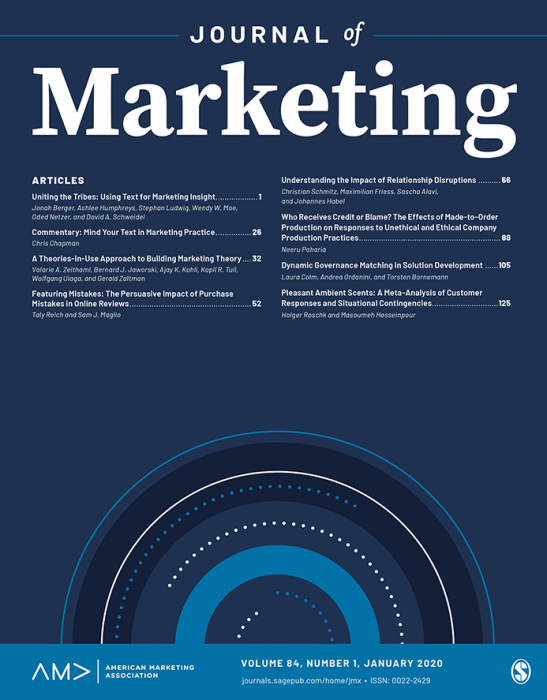User-Generated Physician Ratings and Their Effects on Patients’ Physician Choices: Evidence from Yelp
IF 11.5
1区 管理学
Q1 BUSINESS
引用次数: 8
Abstract
Patients increasingly rely on online physician ratings to select their physicians and make health care decisions. However, it is unclear whether online physician ratings signal physician quality information and affect patients’ physician choices. By combining physician rating data from Yelp with data from Medicare, which covers a large elderly patient group, the authors find that ratings are positively associated with important measures of physician quality, including physicians’ credentials, adherence to clinical guidelines, and patients’ health outcomes. They introduce novel instrumental variables, where reviewers’ leniency in rating other businesses is employed as an instrument for physicians’ ratings. They find that an increase in physicians’ average rating increases physicians’ patient flow. To understand the quality signals that patients respond to, the authors also use the latent Dirichlet allocation model and extract topics from review texts. Patients respond differentially to different information and respond most to information about physicians’ interpersonal and clinical skills. In addition, rating credibility, accessibility, and strength of other existent signals moderate the positive effects of online ratings on patient flow. Overall, online physician rating platforms can promote efficiency by disseminating important quality information to patients and directing patients to higher-quality physicians.用户生成的医生评分及其对患者医生选择的影响:来自Yelp的证据
患者越来越依赖在线医生评级来选择他们的医生并做出医疗保健决定。然而,尚不清楚在线医生评分是否能传达医生质量信息并影响患者对医生的选择。通过将来自Yelp的医生评级数据与覆盖大量老年患者群体的医疗保险数据相结合,作者发现,评级与医生质量的重要指标呈正相关,包括医生的资质、对临床指导方针的遵守以及患者的健康结果。他们引入了新的工具变量,其中审稿人对其他企业的评分宽大度被用作医生评分的工具。他们发现,医生平均评分的提高会增加医生的病人流量。为了了解患者对质量信号的反应,作者还使用了潜在的狄利克雷分配模型,并从综述文本中提取主题。患者对不同的信息反应不同,对医生的人际关系和临床技能的信息反应最多。此外,评分可信度、可及性和其他现有信号的强度调节了在线评分对患者流量的积极影响。总体而言,在线医生评分平台可以通过向患者传播重要的质量信息并引导患者寻找更高质量的医生来提高效率。
本文章由计算机程序翻译,如有差异,请以英文原文为准。
求助全文
约1分钟内获得全文
求助全文
来源期刊

Journal of Marketing
BUSINESS-
CiteScore
24.10
自引率
5.40%
发文量
49
期刊介绍:
Founded in 1936,the Journal of Marketing (JM) serves as a premier outlet for substantive research in marketing. JM is dedicated to developing and disseminating knowledge about real-world marketing questions, catering to scholars, educators, managers, policy makers, consumers, and other global societal stakeholders. Over the years,JM has played a crucial role in shaping the content and boundaries of the marketing discipline.
 求助内容:
求助内容: 应助结果提醒方式:
应助结果提醒方式:


